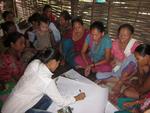From power struggle to benevolent authority and empathic limit setting: Creating inclusive school practice with excluded students through action research

Empathic limit setting” is an effective innovative “relational” alternative to punishment with the toughest kids – developed with and by teachers through participative action research. It’s a great example of building actionable theory from practice, a valuable read for teachers, or anyone, working with risk/excluded young people.” Children who are excluded, for whatever reason, experience […]
Read More...



